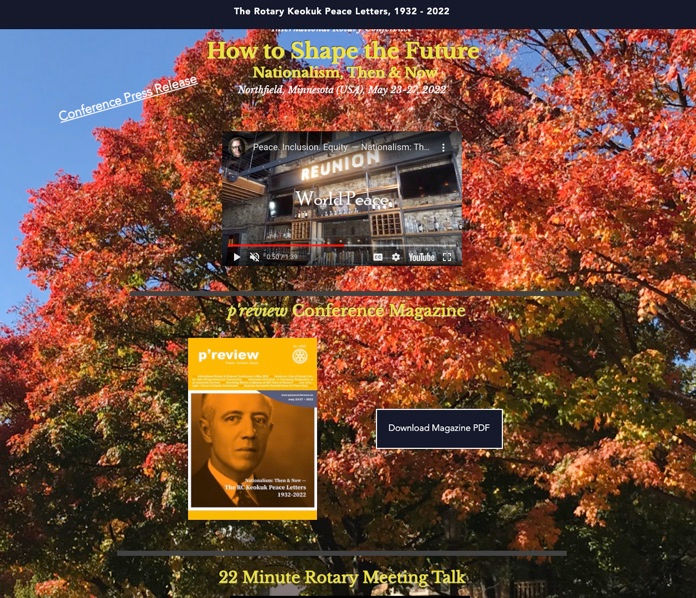Legacy of 1848 Conference Talks, Wartburg College, 2013
- Joachim Reppmann
- Mar 16, 2017
- 2 min read
In short, the Legacy of 1848 Conference will attempt to highlight the timeless legacy of democratic and moral values the Forty-eighters brought to America.
We have the collection of talks of distinguished scholars from both Germany and America from the 2013 Wartburg College Legacy of 1848 Conference. Including such speakers as Professor Karl Fink, Edith Robbins, Michael Meyer, Marvin Kissmer, Tova Brandt, and Amanda Wolfson, these recordings present intriguing research about the 1848ers and their lasting impact on today’s world.
(To skip forwards and backwards through the playlist, use the arrows in the bottom-left. To jump directly to any session, push “Playlist,” in the top left, and navigate from there.)
MONDAY, OCTOBER 21, 2013
Opening Remarks Darrel Colson, President, Wartburg College; Joachim “Yogi” Reppmann, The Forgotten Forty-Eighter: The Wilhelm von Schirach Story and the Stoltenberg Forty-Eighter Institute; Daniel Walther, Gerald Kleinfeld Distinguished Professor in German History, Wartburg College
Session 1A—Yogi Reppmann Daniel Nagel, The Democratic Republicanism of the German Forty-Eighters; David Ellis, The Other Forty-Eighters: Redefining ‘Freedom’ in the Wake of the 1848 Revolution; Martin Rackwitz, Why did the Schleswig-Holstein-Question lead to the failure of the German national parliament in 1848?
Session 2A—Klaus Lemke-Paetznick Alison Orton, German Anarchists and Bohemian Savages?: Chicago’s Ethnic Militias, 1848 Ideology, and United States Citizenship, 1870 – 1880; Terrence Lindell, Henry Goldhammer, Waverly’s Forgotten Forty-Eighter; Vern Rippley, Albert Wolff, Minnesota’s German Forty-Eighter
Session 2B—Yvonne Losch Derk Janssen, Exchange of Ideas: Transatlantic Political Concepts; Karl Fink, Schiller’s Ode to Joy in Different Tones
Session 3A—Niels Eichhorn Edith Robbins, Fred Hedde, Immigration Agent for the State of Nebraska; Jan Jessen, Those left behind – The effects of the immigration on the Duchy of Schleswig
TUESDAY, OCTOBER 22, 2013
Session 4A Niels Eichhorn, Separatist Forty-Eighters: The United States and a Legacy of 1848; Peter Mathews, Harro Harring,Life and struggle of a forgotten poet and knight of freedom; Peter Lubrecht, Mapping the United States and Drawing the Civil War: Charles T. Lubrecht, “Forty-Eighter” Lithographer and Artist
Session 5A—Terry Lindell Larry Gill, Why were Forty-Eighters in the Civil War?; Joseph Cofield, Franz Sigel and the German Forty-Eighters: Impact on the American Civil War; Amanda Wolfson, The Newspaper as a Site of Collective Memory: The New Ulm Post and the U.S.-Dakota War of 1862
Session 5B Matthew Lindaman, Divergent Paths: Context and Opportunity in the Lives of Three Forty-Eighters; Christopher Brooks, Der Pionier, African-Americans, and Abolitionist America: The Case of John S. Rock; Marvin Kissmer, Panic of 1857 – Davenport’s Forty-Eighter in the First Global Financial Crisis
Session 6A—Jan Jessen and Yogi Reppmann Roundtable Discussion, Parallels in Immigrant and Ethnic Museums: Tova Brandt, Danish Immigrant Museum, Elk Horn; Laurann Gilbertson, Vesterheim, Norwegian-American Museum, Decorah
Session 7A—Martin Rackwitz Klaus Lemke-Paetznick, Theodor Olshausen’s History of the Mormons; Joachim Bodenstaff, Olshausenstele 2009 – Modern Forty- Eighter Culture of Memory; Yogi Reppmann, The Stoltenberg Institute for German-American Forty-Eighter Studies



Comments